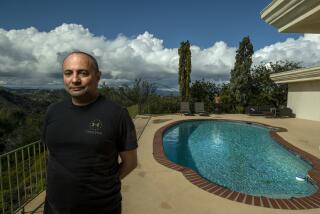Judgment in Izvestia Libel Case Overturned
- Share via
A Los Angeles federal judge overturned a default judgment won by a Palo Alto businessman against the official Soviet newspaper Izvestia and released $456,000 in Soviet funds frozen to pay the award, it was reported Tuesday.
U.S. District Judge David V. Kenyon’s clerk confirmed that the judge had issued two orders in the Raphael Gregorian case, but she declined to discuss them. However, United Press International reported late in the day that it had confirmed the contents of the orders. Kenyon could not be reached for comment.
For the record:
12:00 a.m. Feb. 5, 1987 For the Record Ruling Under Submission
Los Angeles Times Thursday February 5, 1987 Home Edition Part 1 Page 2 Column 1 Metro Desk 2 inches; 49 words Type of Material: Correction
In some Wednesday editions, The Times, relying on incorrect information provided by United Press International, reported that U.S. District Judge David V. Kenyon had overturned a default judgment in the case of a Palo Alto businessman who had sued Izvestia for libel. The judge did not overturn the judgment, which he still has under submission.
Gregorian’s attorney, Gerald Kroll, said he “wouldn’t be able to say a word” because he had not received copies of the rulings. “We haven’t heard a thing from the court about that,” he said.
Had Won $413,000
The judge awarded Gregorian, 57, owner of a Palo Alto medical equipment firm, $413,000 last summer on the claim that Izvestia had harmed his business of importing medical and laboratory equipment into the Soviet Union by falsely accusing him of being a spy. The Soviet defendants declined to defend themselves, claiming that they were immune to the action.
At the request of Gregorian’s attorney, Kenyon froze funds belonging to the Soviet Union’s Bank for Foreign Trade to satisfy the judgment. After that, the Soviets sought and received permission to enter the case.
At hearings last week, lawyers representing two Soviet agencies and the U.S. government called on Kenyon to vacate his default judgment and release the bank funds.
An attorney for V/O Medezport and V/O Licensintorg, Martin Popper, maintained that Kenyon lacked jurisdiction to rule for Gregorian because of terms of the U.S. Foreign Sovereign Immunities Act.
Popper, a New York-based lawyer, pointed out that libel suits against foreign sovereigns are specifically precluded by the act, which was approved by Congress in 1976. Popper argued that if the court did not have jurisdiction it follows that Kenyon’s default judgment should be vacated.
Department of Justice attorney Elizabeth Sarah Gere agreed that libel suits against sovereign nations are forbidden by U.S. law, which she said must be interpreted correctly to prevent possible diplomatic problems in other nations throughout the world.
Gregorian’s lawyer insisted that Soviet agencies such as Izvestia are not exempt from libel actions because they engage in commercial business in the United States. He declared that the Soviets had defended themselves in earlier libel actions and now “they want to pick and choose.”
Kenyon’s action Tuesday apparently set the stage for a possible hearing on whether the court has jurisdiction in the case, or whether the Soviet Union can be sued for libel under the Foreign Sovereign Immunities Act.
Kenyon had promised to rule quickly on whether the Soviet funds should be released after hearing the testimony last week of a Soviet attorney who came to Los Angeles from Moscow and testified that the money belonged to the Bank for Foreign Trade and not to any of the defendants named in the Gregorian suit.
More to Read
Sign up for Essential California
The most important California stories and recommendations in your inbox every morning.
You may occasionally receive promotional content from the Los Angeles Times.













